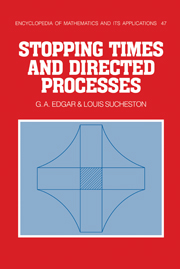Preface
Published online by Cambridge University Press: 21 January 2010
Summary
The main themes of this book axe: stochastic, almost sure, and essential convergence; stopping times; martingales and amarts; processes indexed by directed sets, multiparameter processes, and Banach-valued processes.
We begin in Chapter 1 with the notion of the stopping time, central to the book. That this notion is important in continuous parameter martingale theory and sequential analysis (briefly touched on in Chapter 3) is well known. This book differs from others in that many of the discrete parameter results are proved via processes (amarts) defined in terms of stopping times—in fact only simple stopping times. The Radon-Nikodým Theorem receives an amart proof. That this theorem follows from the martingale theorem is well known, but here martingales come later, so that the Radon-Nikodým theorem is available to define the conditional expectation and the martingale. In Chapter 4, the rewording of the Vitali covering conditions in terms of stopping times clarifies connections with the theory of stochastic processes.
The main result, the Amart Convergence Theorem, is proved by elementary arguments. This—together with a general Sequential Sufficiency Theorem (1.1.3), showing how in metric spaces the convergence of increasing sequences implies that of nets—is used to obtain stochastic convergence of L1-bounded ordered amarts on directed sets. This in turn implies stochastic convergence of quasimartingales—even on directed sets. Quasimartingales include the L1-bounded submartingales studied by Krickeberg on directed sets. We believe the proofs by this method are shorter than those existing in the literature.
Information
- Type
- Chapter
- Information
- Stopping Times and Directed Processes , pp. ix - xiiPublisher: Cambridge University PressPrint publication year: 1992
